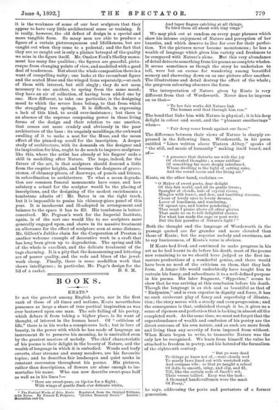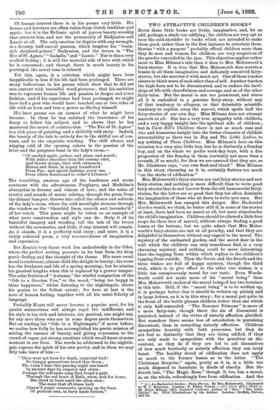BOOKS.
KEATS.* IF not the greatest among English poets, nor in the first rank of those of all times and nations. Keats nevertheless possesses as large a share of true poetical inspiration as was -ever bestowed upon one man. The sole failing of his poetry, -which debars it from taking a higher place, is its want of thought, of interest in the human heart. Of "criticism of life," there is in his works a conspicuous lack; but in love of beauty, in the power with which he has made of language an instrument fit to preserve his meaning, he is unrivalled even by the greatest masters of melody. The chief characteristic of his poems is their delight in the beauty of Nature, and the wealth of language in which it is embodied. Woods and leafy coverts, clear streams and sunny meadows, are his favourite topics ; and he describes fair landscapes and quiet nooks in constant succession throughout his poems. His pictures, rather than descriptions, of flowers are alone enough to im- mortalise his name. Who can now describe sweet-peas half as well as in his lines P-
" Here are sweet-peas, on tip-toe for a flight :
With wings of gentle flush o'er delicate white,
* The Poetical Works of John Keats. Reprinted from the Original Editions, -with Notes. By Francis T. Ealgrave. ":Golden Treasury Series." London : Macmillan and Om
And taper fingers catching at all things, To bird them all about with tiny rings."
We may pick out at random on every page phrases which show his intense enjoyment of Nature and perception of her beauties, and which deserve to live for ever for their perfec- tion. Yet the pictures never become monotonous ; he has a wealth of language which gives him variety and freshness to be compared with Nature's alone. But this very abundance of detail detracts something from his poems as complete wholes.
It seems sometimes as though the story he undertakes to tell, were but an excuse for wandering among beautiful scenery and showering down on us one picture after another. The illustrations and detail destroy the effect of the whole ; the gorgeous colouring obscures the form.
The interpretation of Nature given by Keats is very different from that of Wordsworth. Never does he impress on us that-
" To her fair works did Nature link
The human soul that through him ran."
The bond that links him with Nature is physical; it is his deep delight in colour and scent, and the "pleasant smotherings " when–.- "Fair dewy roses brush against our faces."
The difference between their views of Nature is sharply ex-
pressed in the following lines. Wordsworth, in his poem entitled "Lines written above Tintern Abbey," speaks of "the still, sad music of humanity" making itself heard, and
of-
" A presence that disturbs me with the joy Of elevated thoughts ; a sense sublime Of something far more deeply interfused, Whose dwelling is the light of setting suns, And the round ocean and the living air."
Keats, on the other hand, exclaims :—
"0 Maker of sweet poets, dear delight
Of this fair world, and all its gentle livers ; Spangler of clouds, halo of crystal rivers, Mingler with leaves, and dew, and tumbling streams, Closer of lovely eyes to lovely dreams, Lover of loneliness, and wandering,
Of upeast eye, and tender pondering !
Thee must I praise above all other glories That smile us on to tell delightful stories.
For what has made the sage or poet write But the fair paradise of Nature's light ? "
Both the thought and the language of Wordsworth in the passage quoted are far grander and more elevated than those of Keats ; but the superior melody and sweetness, not to say lusciousness, of Keats's verse is obvious.
If Keats had lived, and continued to make progress in his art as he had learnt to do before his death, most of the poems now remaining to us we should have judged as the first im- mature productions of a wonderful genius, and there would have been no need of the criticism on them, that they lack form. A longer life would undoubtedly have taught him to restrain his fancy, and subordinate it to a well-defined purpose in his poems. His later fragment, "Hyperion," seems to show that he was arriving at this conclusion before his death. Though the language is as rich and as beautiful as that of " Endymion," and is even superior in dignity and force, it has no such exuberant play of fancy and superfluity of illustra- tion ; the story moves with a steady and even progression ; and the consequence is that, unfinished though it be, it gives us a sense of ripeness and perfection that is lacking in almost all the completed work. At the same time, we must not forget that the superabundance of wealth and confusion of his poetry are the direct outcome of his own nature, and as such are more fresh and living than any severity of form imposed from without. When Keats began to write, to transcribe Nature was the only law he recognised. We learn from himself the value he attached to freedom in poetry, and his hatred of the formalism of the eighteenth century.
"But ye were dead To things ye knew not of,—were closely wed To musty laws lined out with wretched rule And compass vile : so that ye taught a school Of dolts to smooth, inlay, and clip, and fit, Till, like the certain rods of Jacob's wit, Their verses tallied. Easy was the task : A thousand handicraftsmen wore the mask Of Poesy,"
he says, addressing the poets and poetasters of a former generation. Of human interest there is in his poems very little. His heroes and heroines are often taken from Greek tradition and myth ; but it is the Hellenic spirit of joyous beauty-worship that attracts him, and not the personality of Endymion and Lamia at all. The only emotion he depicts with any strength, is a dreamy, half-unreal passion, which inspires his "brain- sick shepherd-prince," Endymion, and the lovers in "The Eve of St. Agnes," " Isahella," and " Lamia." Nor is this a very exalted feeling ; it is still the material side of love with which he is concerned ; and though there is much beauty in his portrayal, the moral tone is relaxed.
Yet this, again, is a criticism which might have been inapplicable to him if his life had been prolonged. There are many indications in his poems which show that he did not rest content with beautiful word-pictures ; that his ambition was to represent human life and passion in deeper and truer fashion ; and if his experience had been prolonged, we might have had a poet who would have touched one or two sides of life with as keen and true a power as Shelley himself.
His later poems are an earnest of what he might have become. In them he has subdued the luxuriance of his fancy to follow his subject, and he shows that he has mastered the secret of construction. "The Eve of St. Agnes" is a rich piece of painting, and a skilfully told story. Indeed, the beauty of the tale is entirely due to the skilful use of con- trast, and to the exquisite wording. The chill silence and nipping cold of the opening ushers in the passion of the lover and the gorgeous feast in the lady's room,—
" Of candied apple, quince, and plum, and gourd ; With jellies smoother than the creamy curd, And lucent syrops, tinct with cinnamon ; Manna and dates, in argosy transferred From Fez; and spiced dainties, every one, From silken Samarcand to cedar'd Lebanon."
The trembling, anxious age of the beadsman and nurse contrasts with the adventurous Porphyro, and Madeline's absorption in dreams and visions of love; and the noise of revelry and sounds of music echoing through the poem from the distant banquet, throws into relief the silence and solitude of the lady's room, where the cold moonlight streams through the window on the "blanched linen, smooth and lavender'd," of her conch. This poem might be taken as an example of what mere construction and style can do. Strip it of its beautiful imagery and wording, tell the tale of the lovers without the accessories, and little, if any, interest will remain. As it stands, it is a perfectly told story; and more, it is a richly coloured poem, a very treasure-house of imagination and expression.
But Keats's very finest work lies undoubtedly in the Odes, where the perfect setting presents in its best form the deep poetic feeling and fine thought of the theme. His more usual mood is exuberant, almost child-like delight in beauty; his verse has the freshness and life of a spring morning; but he attains his greatest heights when this is replaced by a graver temper. The calm fruition of "Autumn," the wistful resignation of the "Ode to a Grecian Urn," or the mood, "being too happy in thine happiness," whilst listening to the nightingale, shows his genius to the fullest extent ; for here at last is the note of human feeling, together with all his usual felicity of language.
Probably Keats will never become a popular poet, for his quaint mannerisms will always repel the indifferent, and his style is too rich and intricate, too poetical, one might say, for any save those who are in some degree poets themselves. But on reading his "Ode to a Nightingale," if never before, we realise how fully he has accomplished his poetic mission of seizing the essence of beauty, and giving eypression to the crowd of vague yet strong emotions which we all know at some moment in our lives. The words he addressed to the nightin- gale express the spirit of his own poetry, and in them we may fitly take leave of him :—
" Thou wast not born for death, immortal bird !
No hungry generations tread thee down ; The voice I hear this passing night was heard In ancient days by emperor and clown : Perhaps the self-same song that found a path Through the sad heart of Ruth, when, sick for home, She stood in tears amid the alien corn ; The same that oft-times hath Chaxm'd magic casements, opening on the foam Of perilous seas, in faery lands forlorn."



































 Previous page
Previous page